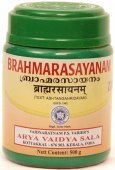Sitopala, Sita-upala, Sitopalā: 6 definitions
Introduction:
Sitopala means something in Hinduism, Sanskrit. If you want to know the exact meaning, history, etymology or English translation of this term then check out the descriptions on this page. Add your comment or reference to a book if you want to contribute to this summary article.
In Hinduism
Ayurveda (science of life)
Source: archive.org: Vagbhata’s Ashtanga Hridaya Samhita (first 5 chapters)Sitopalā (सितोपला) refers to “sugar”, as mentioned in verse 5.29-31 of the Aṣṭāṅgahṛdayasaṃhitā (Sūtrasthāna) by Vāgbhaṭa.—Accordingly, “[...] Of sour digestion and taste, constipating, heavy, (and) warming (are) curds [viz., dadhi]; Never shall one take them at night, never warm, (and) not in spring, summer, and autumn (in any other season) not without mung-bean soup nor without honey nor without ghee and sugar [viz., na-a-ghṛta-sitopalā] nor without emblic myrobalans, also not continuously and not slightly unfinished”.
Note: Instead of śa-kha-ra, a Tibetanization of śarkara here corresponding to sitopala (“sugar-crystal, sugar”), NP1 write kha-ra śa (“sugar and meat”), which implies a (doubtless corrupt) variant sitopala. The change is remarkable as it cannot possibly have been made without consulting a Sanskrit text.

Āyurveda (आयुर्वेद, ayurveda) is a branch of Indian science dealing with medicine, herbalism, taxology, anatomy, surgery, alchemy and related topics. Traditional practice of Āyurveda in ancient India dates back to at least the first millenium BC. Literature is commonly written in Sanskrit using various poetic metres.
Languages of India and abroad
Sanskrit dictionary
Source: DDSA: The practical Sanskrit-English dictionarySitopala (सितोपल).—
1) a crystal.
2) chalk.
Derivable forms: sitopalaḥ (सितोपलः).
Sitopala is a Sanskrit compound consisting of the terms sita and upala (उपल).
--- OR ---
Sitopalā (सितोपला).—candied sugar.
Sitopalā is a Sanskrit compound consisting of the terms sita and upalā (उपला).
Source: Cologne Digital Sanskrit Dictionaries: Shabda-Sagara Sanskrit-English DictionarySitopala (सितोपल).—n.
(-laṃ) Chalk, or mineral substance of similar appearance considered as a variety. m.
(-laḥ) Crystal. f.
(-lā) Clayed or candied sugar. E. sita white, and upalā a stone.
Source: Cologne Digital Sanskrit Dictionaries: Monier-Williams Sanskrit-English Dictionary1) Sitopala (सितोपल):—[from sita] m. ‘wh° stone’, chalk, [cf. Lexicographers, esp. such as amarasiṃha, halāyudha, hemacandra, etc.]
2) [v.s. ...] crystal, [ib.]
3) [v.s. ...] rock-crystal, [ib.]
4) Sitopalā (सितोपला):—[from sitopala > sita] f. sugar, [Kāvya literature; Suśruta; Pañcarātra] (mc. also pala)
5) [v.s. ...] white or refined sugar, [Monier-Williams’ Sanskrit-English Dictionary]
6) Sitopala (सितोपल):—[from sita] n. chalk, [ib.]
Source: Cologne Digital Sanskrit Dictionaries: Yates Sanskrit-English DictionarySitopala (सितोपल):—[sito+pala] (laṃ) 1. n. Chalk. m. Crystal. 1. f. Candied sugar.
[Sanskrit to German]
Sanskrit, also spelled संस्कृतम् (saṃskṛtam), is an ancient language of India commonly seen as the grandmother of the Indo-European language family (even English!). Closely allied with Prakrit and Pali, Sanskrit is more exhaustive in both grammar and terms and has the most extensive collection of literature in the world, greatly surpassing its sister-languages Greek and Latin.
See also (Relevant definitions)
Ends with: Asitopala, Ghritasitopala, Sasitopala.
Full-text: Sasitopala, Ikshu, Upala.
Relevant text
Search found 3 books and stories containing Sitopala, Sita-upala, Sitopalā, Sita-upalā; (plurals include: Sitopalas, upalas, Sitopalās, upalās). You can also click to the full overview containing English textual excerpts. Below are direct links for the most relevant articles:
Shri Gaudiya Kanthahara (by Srila Bhaktisiddhanta Sarasvati)
The Garuda Purana (by Manmatha Nath Dutt)
Chapter CCXXVII - Different names of the Ayurvedic Drugs < [Dhanvantari Samhita]
Atharvaveda and Charaka Samhita (by Laxmi Maji)
2b. Tuberculosis (Yakṣmā or Rājayakṣmā) in the Caraka-Saṃhita < [Chapter 5 - Diseases and Remedies in Atharvaveda and Caraka-Saṃhitā]
Related products
